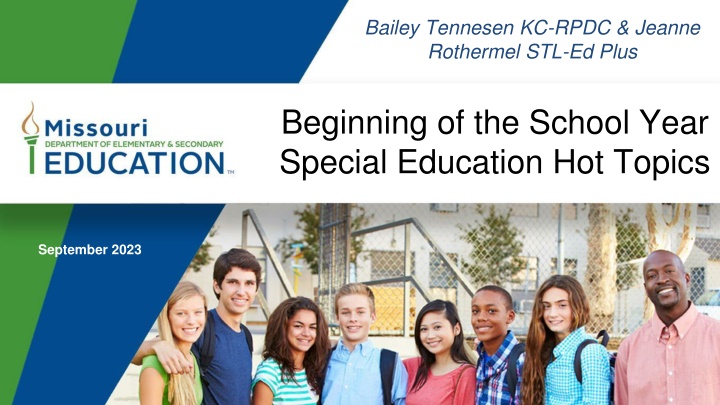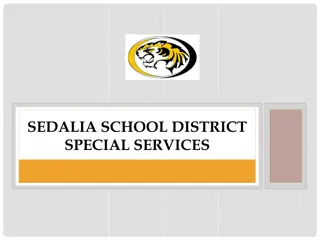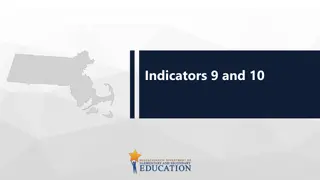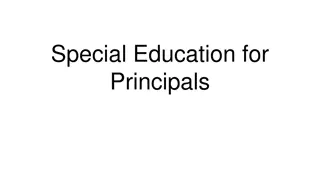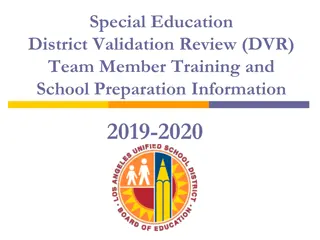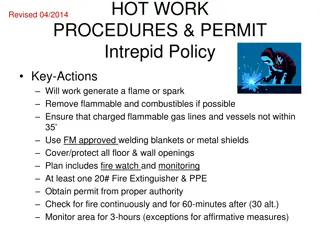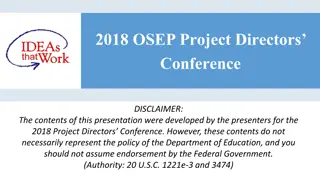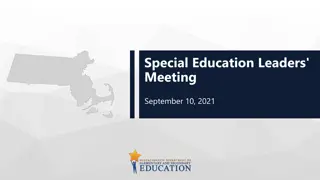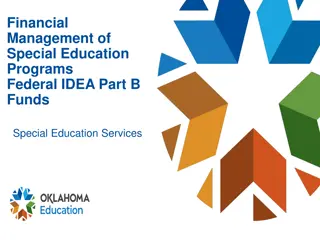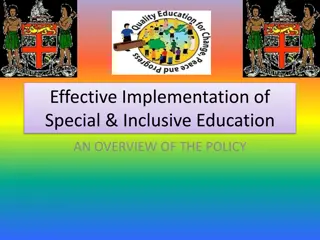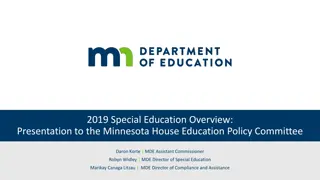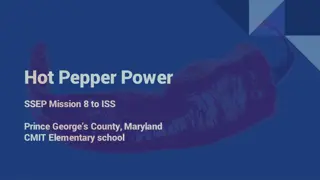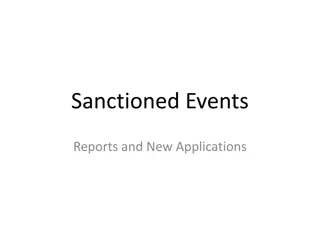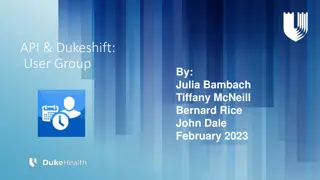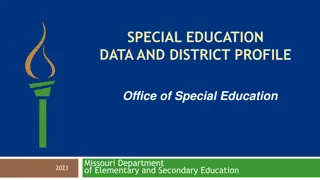Special Education Hot Topics Overview September 2023
Explore the key subjects covered in the Special Education Hot Topics session for September 2023. Topics include state plan updates, compliance reminders, reading success plans, and more. Get insights on regulations, FAPE, IEPs, and LRE responsibilities. Discover the meeting norms and objectives for the day. Review essential information on services plans for students with disabilities enrolled in private schools and the agency responsible for FAPE implementation. Stay informed and engaged in the special education field.
Download Presentation

Please find below an Image/Link to download the presentation.
The content on the website is provided AS IS for your information and personal use only. It may not be sold, licensed, or shared on other websites without obtaining consent from the author.If you encounter any issues during the download, it is possible that the publisher has removed the file from their server.
You are allowed to download the files provided on this website for personal or commercial use, subject to the condition that they are used lawfully. All files are the property of their respective owners.
The content on the website is provided AS IS for your information and personal use only. It may not be sold, licensed, or shared on other websites without obtaining consent from the author.
E N D
Presentation Transcript
Bailey Tennesen KC-RPDC & Jeanne Rothermel STL-Ed Plus Beginning of the School Year Special Education Hot Topics September 2023
Zoom Support Meeting Norms Mute unless you are speaking to the group Use the chat to ask questions Be mindful when asking questions about specific situations. Do not give out personally identifiable information. Remember all questions in the chat will be gathered and answered at a later date. A Q&A will be posted on our virtual special education resource page.
Objectives for Today State Plan Updates Local Compliance Plan Reminder Special Education Form Updates Special Education Hot Topics Reading Success Plans Substitutes in Sped Kindergarten Assessments Physical Therapy IEP Records Virtual Schools Non Public Consultation Meeting Special Education Data Resources
4 State Plan Updates Effective July 30th, 2023
Regulation I General Provisions Page 21 Services Plan: Services plan means a written statement that describes the special education and related services the LEA will provide to a parentally- placed child with a disability enrolled in a nonprofit private elementary or secondary school who has been designated to receive services, including the location of the services and any transportation necessary, consistent with 34 CFR 300.132 and is developed and implemented in accordance with 34 CFR 300.137 through 300.139.
Regulation IV FAPE IEP LRE Page 45 AGENCY RESPONSIBLE FOR FAPE The public agency or special school district in which a student with a disability resides is responsible for implementation of FAPE. Students with disabilities or severe disabilities who are admitted to programs and facilities of the Department of Mental Health or whose domicile is in one public agency, but actually reside in another public agency as a result of a placement arranged by or approved by the Department of Mental Health, the Department of Social Services, or a court of competent jurisdiction shall be provided special education and related services in the public agency where the student actually resides. Students enrolled in full-time MOCAP approved virtual education programs hosted by a Missouri school district are enrolled in the host school district. The host school district is responsible for implementation of FAPE.
Regulation IV FAPE IEP LRE Page 46 AGENCY RESPONSIBLE FOR FAPE Listed below are the statutes of the state of Missouri which provide the legal basis and source Missouri s policy relating to FAPE. (1) Section 162.670, RSMo (2) Section 162.675, RSMo (3) Section 162.680, RSMo (4) Section 217.355(4), RSMo (5) Section 162.700(1), RSMo (6) Section 219.021, RSMo (7) Article IV, Section 37(a), Missouri Constitution (8) Section 161.670 Subsection 3(4), RSMo
Regulation V Procedural Safeguards/ Discipline Page 65 A copy of the state approved procedural safeguards available to the parents of a student with a disability and a copy of the Parents Bill of Rights, per section 161.850 RSMo, shall be given to parents only one (1) time a school year, except that a copy also shall be given to the parents:
Regulation VIII: Personnel Standards- Orientation and Mobility Specialist Page 103
10 Adopting/Adapting the Local Compliance Plan http://dese.mo.gov/local-compliance-plan
Remember: Public agencies must adopt or adapt a Local Compliance Plan by October 1, 2023 Please note: Even if your agency does not receive any IDEA Part B funds, your agency is still required to have a local compliance plan and submit annual assurances to DESE regarding the provision of services to students with disabilities under the IDEA.
Step 1: Local Compliance Plan Options Option A. Adopt the model plan provided by the Department of Elementary and Secondary Education (DESE). If the agency adopts the state s model plan, it is automatically approved by DESE. You do not need to submit a copy of your plan to DESE, but a certification statement must be submitted. Option B. Adopt the model plan with local revisions. The agency must submit a copy of the pages on which revisions have been made with the revisions highlighted. These revisions must be approved by DESE before the agency s compliance becomes final. (Note: Simply placing your agency s name into the model plan does not constitute a revision. Revisions are substantive changes to the content of the plan.) Option C. Write your own compliance plan. The agency must submit a copy of the plan for approval by DESE. The agency s plan will not become final until receipt of approval from DESE.
Step 2: Your agency s governing board must approve the Local Compliance Plan and complete the enclosed certification statement. (see notes 1-4) If your agency s governing board chooses Option B or C please contact DESE for documents needed at Pam.Blagden@dese.mo.gov
Step 3: For all options listed above, submit the certification statement to the address below. The certification can be found at: https://dese.mo.gov/media/pdf/certification-statement . Also, submit the model compliance plan to DESE only if required in accordance with the instructions in Step 1, option B or C. All required documentation is to be submitted to: MO Department of Elementary and Secondary Education Office of Special Education-Compliance Attn: Madison Bockover P.O. Box 480 Jefferson City, MO 65102 Fax: 573-751-0699 Email: secompliance@dese.mo.gov
Certification Statement https://dese.mo.gov/media/pdf/certification-statement
More information: https://dese.mo.gov/l ocal-compliance-plan
17 DESE Special Education Form Updates https://dese.mo.gov/media/pdf/forms-change-chart
Present Level: Removal of Informal and Formal Transition Assessments
Form C: Post- Secondary Transition Goals
Form C: Course of Study
Need more resources on transition plans? Contact your local RPDC Compliance and Improvement Consultants for transition training opportunities and resources!
Form D: Accommodations
26 Special Education Hot Topics
27 Reading Success Plan Guidance (RSP) for Students with Disabilities
RSP Process for ALL students in grades K-3 https://dese.mo.gov/media/pdf/reading-success-plan-guidance-missouri-school-districts
RSP Guidance The Missouri reading initiatives address the instructional needs of all students who are found to have a substantial reading deficiency (SRD). Each IDEA eligible student comes with unique backgrounds and learning experiences. Some students will have RSP elements embedded within their IEPs and others will have a separate RSP document.
RSP Guidance Students who have an IEP that includes reading goals do not require an RSP. However, students who have an IEP that does not include reading goals and meet the requirements for an RSP must have an RSP. The individual needs of the student should dictate the goals and supports provided. All reading instruction must be evidence -based and grounded in the science of reading https://dese.mo.gov/media/pdf/reading-success-plan-guidance-missouri-school-districts
Remember: Students with disabilities should always be considered general education students first and only removed from the instruction provided in the general education setting, including interventions for reading, when the specific needs of the child cannot be met in that setting.
RSP Scenario 1 Meet Jason Other Health Impaired (medical diagnosis of ADHD) Met criteria that qualified him for an RSP. IEP Team agrees reading challenges are not a result of ADHD. Does Jason need a separate RSP or have it embedded within his IEP?
What did the team determine? RSP will be developed separately from the IEP RSP will be implemented by general education teachers The reading teacher will reference the IEP for needed accommodations.
Key Takeaway From Scenario 1 Jason requires an RSP. The team would collaborate to ensure that the student is receiving universal and targeted instruction designed to meet his reading needs and that his progress is documented in the RSP. The IEP will continue to address Jason s educational needs related to ADHD.
RSP Scenario 2: Meet Georgia Specific Learning Disability in Basic Reading Skills and Reading Comprehension. IEP has included reading proficiency information within the present levels and goals to address identified concerns Does Georgia need a separate RSP or have it embedded within her IEP?
What did the team determine? A separate RSP is not necessary Special education teacher will provide SDI for reading deficits. General education reading interventionist will collaborate with sped staff to ensure reading instruction is evidence based and grounded in the science of reading
Key Takeaway from Scenario 2 A separate RSP is not necessary. Due to the student having a reading disability in the same areas identified on the required reading assessment, the information has been embedded into the IEP. Collaboration between general education and special education is key. Reading instruction must be evidence-based and grounded in the science of reading.
39 Substitutes in Special Education
40 Can Substitutes Provide Special Education Services? The IDEA requires special education teachers be properly certified according to their state requirements. IDEA does not address substitute teachers specifically. The MO State Board of Education approved new changes in June 2022 that allow different paths to becoming a substitute teacher in Missouri. With continuing teacher shortages many districts are turning to the use of long- term substitutes. Long-term substitutes may be used to fulfill shortages in the special education classroom, but special attention needs to be paid to the compliance requirements of IDEA regarding FAPE and IDEA required paperwork
Can a substitute teacher case-manage, write IEP s to students with disabilities? There is currently nothing in Federal Law or Missouri Law that prohibits a substitute for a special education teacher from doing any of these things. Substitutes should be supervised and be provided with support from a certified special education teacher, process coordinator, or administrator. Positions filled by long-term substitutes will need to be monitored more closely to ensure compliance. MAKE EVERY EFFORT to have a properly certified special education teacher perform as many of those duties as possible.
Helpful Tips When Using Long Term Subs: Involve them in any Special Education Professional Development (SPED PD) training you conduct in the district or that are offered by the RPDC. Show them all of DESE s compliance resources (including recorded Zooms, Myths, forms etc). Conduct a boot camp in which you give them an overview of the SPED process, IEP implementation, how to collect IEP goal data on their specific IEPs, and any specific instructional strategies they may need to fully implement their students IEPs. Keep detailed records of all the training you have provided them. Assign a mentor to each long term substitute teacher - someone who can check in with them on a frequent basis to provide support and answer questions. Consider having a mentor to assist them with IEP development and have the mentor attend their IEP meetings.
43 Kindergarten Assessment
Are students who have already been identified as eligible for special education required to take the kindergarten assessment? YES, all kindergarten students need to take the kindergarten assessment. The Kindergarten Observation Form (KOF) option is mostly observational, which could be utilized for our students with disabilities. There is also a don t know/not observed option that can be chosen as well - use this option sparingly.
45 Physical Therapy
Senate Bill 51 This act repeals provisions limiting the ability of a physical therapist to examine and treat certain conditions or injuries without a prescription or referral. PTs should consult with approved health care providers after 10 visits or 30 days (whichever occurs first) before continuing physical therapy. Work with your PT and 3rd party billing administrator for more information.
Physical Therapy Information Cont. The State of Missouri has passed new laws that allow Direct Access to Physical Therapy without a physician's script. These new laws will go into effect on August 28, 2023. These laws will repeal some old language and revise it with new language to reflect the changes in the Physical Therapist Practice Act. These are found in the RSMO 334.100, 334.506, and 334.613. These do come with visit limit restrictions. However, House Bill 115 was introduced by Representative Brenda Shields to remove those visit limit restrictions from students in a primary educational setting, under the age of 21, and under an annual IEP. This bill passed and also went into effect August 28, 2023. This means that physical therapy does not need a script to see kids. HOWEVER, Medicaid as a payer still requires a script for billing and reimbursement of services for Medicaid eligible students. The Medicaid eligible kids will still need the script to bill Medicaid but not to be seen.
48 IEP Records
Senate Bill 106 For the 2023-2024 school year and all subsequent school years, a students special education record shall be deemed a permanent record and shall be maintained as part of the child s cumulative scholastic record (75 years). A special education record means an IEP, an IFSP, or a 504 Plan Law says must maintain the most recent special education record. The most recent IEP (hard or electronic copy) should be stored- but keep in mind that if it is electronic, you need to ensure that it is securely maintained. (Section 167.027)
50 Virtual Schools
